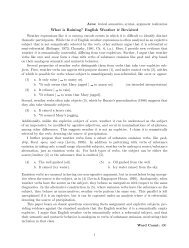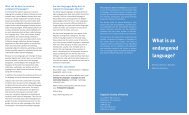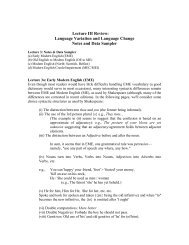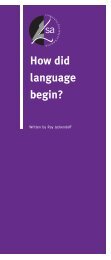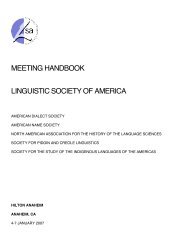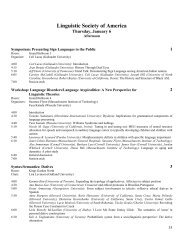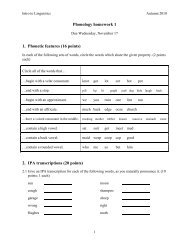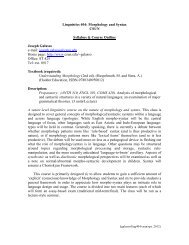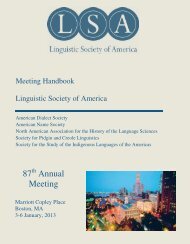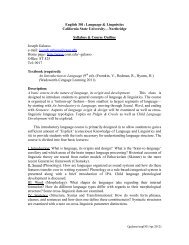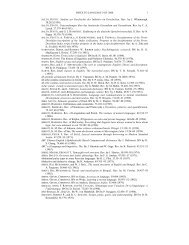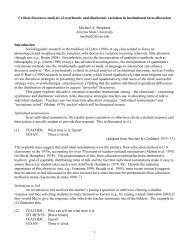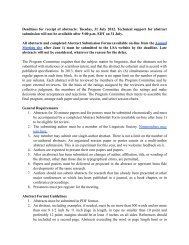here - Linguistic Society of America
here - Linguistic Society of America
here - Linguistic Society of America
Create successful ePaper yourself
Turn your PDF publications into a flip-book with our unique Google optimized e-Paper software.
WorkshopSunday, 6 JanuaryThe workshop is organized into a one-hour poster session, highlighting cases <strong>of</strong> collaborative endangered language researchworldwide, and a panel including presentations and discussion. The posters provide the context for the more theorized papers anddiscussion found in the panel. Both posters and panel presentations consider such questions as how collaboration withcommunity is defined in linguistic research, how ‘community’ is defined, how the roles played by linguists and communitymembers in the research process are redefined in collaborative models so that the priorities and expertise <strong>of</strong> languagecommunities and speakers are considered in the design and implementation <strong>of</strong> the research, when or why it might be appropriateand/or useful for linguists and communities to engage in collaborative research, what kinds <strong>of</strong> collaboration are appropriate (ornot) in different parts <strong>of</strong> the world. The workshop considers different models <strong>of</strong> collaboration in research and varying degrees <strong>of</strong>community engagement. Finally, it addresses such questions as what the limitations and/or strengths <strong>of</strong> collaborative projects are,what the value <strong>of</strong> collaboration is to communities and to the field <strong>of</strong> linguistics, whether the same types <strong>of</strong> (best) practices areappropriate in all collaborative projects, and who ‘controls’ the research in collaborative projects.Panel Presentation Abstracts:Elena Benedicto (Purdue University)Mayangna Yulbarang Balna (URACCAN)The ‘natural’ evolution <strong>of</strong> a collaborative PAR-based model <strong>of</strong> linguistic workWe address the evolution <strong>of</strong> a collaborative Participatory Action Research (PAR)-based model over a 15-year period, identifyingthe conditions making the model possible, while discussing the consequences for its longer-term continuity. Developed with theMayangna community in Nicaragua, its long-term goal is to obtain the self-sufficiency and autonomy <strong>of</strong> the language communityvia the creation <strong>of</strong> an indigenous team <strong>of</strong> linguists. The ultimate goal is to nullify imbalances <strong>of</strong> power arising from the presence<strong>of</strong> external linguist members <strong>of</strong> dominant cultures.Success elements are: a) social awareness by the local linguistic group, b) presence <strong>of</strong> a (new) culturally sensitive university andc) the existence <strong>of</strong> a national, cultural and language-specific educational system. The abstract principles underlying this model areexportable to other areas, though the specific implementation will vary. Currently, though a reasonably autonomous team existsand works, a renewable self-sustaining system is needed for long-term continuity.Lise M. Dobrin (University <strong>of</strong> Virginia)Saul Schwartz (Princeton University)Is collaboration really the goal?Contemporary documentary linguists have expressed a seemingly inexhaustible interest in collaborative research methods, despitetheir uneasy fit with disciplinary values. In this paper we argue that the movement for collaboration is less about refining a‘method’ in the service <strong>of</strong> scientific goals than an effort to promote and participate in moral relationships across social difference.From this perspective, the challenge is not how to collaborate, but how to develop culturally contextual understandings <strong>of</strong> whatmoral relationships entail, especially when our interlocutors’ perspectives are not explicitly attuned to issues <strong>of</strong> linguistic diversityor not otherwise aligned with our own. We explore the anthropological model <strong>of</strong> participant observation as a productive path formeeting this challenge. By acknowledging that social relations are both essential for producing knowledge and personallyenriching experiences with a momentum <strong>of</strong> their own, this model constructs community engagement as a legitimate—indeedconstitutive—element <strong>of</strong> linguists’ pr<strong>of</strong>essional activity.Arienne M. Dwyer (University <strong>of</strong> Kansas)Competing ideologies <strong>of</strong> collaborative researchAdvocating collaboration is born both <strong>of</strong> perceived necessity and ideology. Collaboration is seen as a necessity, since for in situlanguage research, community partnerships and interdisciplinary work have resolved problems <strong>of</strong> non-collaborative research (e.g.fraught communication, lack <strong>of</strong> access, limitations <strong>of</strong> data, theory, or methodology). But this advocacy also reflects ideologies <strong>of</strong>“empowering research” (Cameron et al. 1992) - which this panel explores.Strenuous objections to collaboration have been raised. Some scholars are concerned that political correctness is overwhelmingacademic concerns (Malik 2000, Crippen and Robinson 2011). Some humanists view collaborative approaches entailing largerdata sets as a covert rejection <strong>of</strong> contemporary literary analysis (Golumbia 2012). I will argue that the pushback againstcollaborative approaches is ideological, rather than methodological or theoretical, and mirrors larger trends in the humanities.Collaboration does not necessarily entail a repudiation <strong>of</strong> solo research.113



